Comprehensive Analysis of Organizational Behavior at Nestle: A Report
VerifiedAdded on 2023/01/12
|21
|7165
|68
Report
AI Summary
This report provides a comprehensive analysis of organizational behavior within Nestle, a multinational food and beverage corporation. It begins by assessing the company's organizational culture, power structures, and political landscape, utilizing Handy's classification model and the French and Raven's model of power to evaluate their impact on employee behavior and team dynamics. The report then delves into various motivational theories and techniques, critically evaluating their application in influencing employee behavior and performance. Furthermore, it contrasts effective and ineffective teams, analyzing team development models to foster dynamic cooperation. Finally, the report examines key organizational behavior concepts and philosophies, justifying and evaluating their influence on behavior within the context of Nestle's operations. The report concludes by synthesizing the key findings and offering insights into how Nestle can optimize its organizational behavior practices to enhance employee engagement, productivity, and overall organizational success.
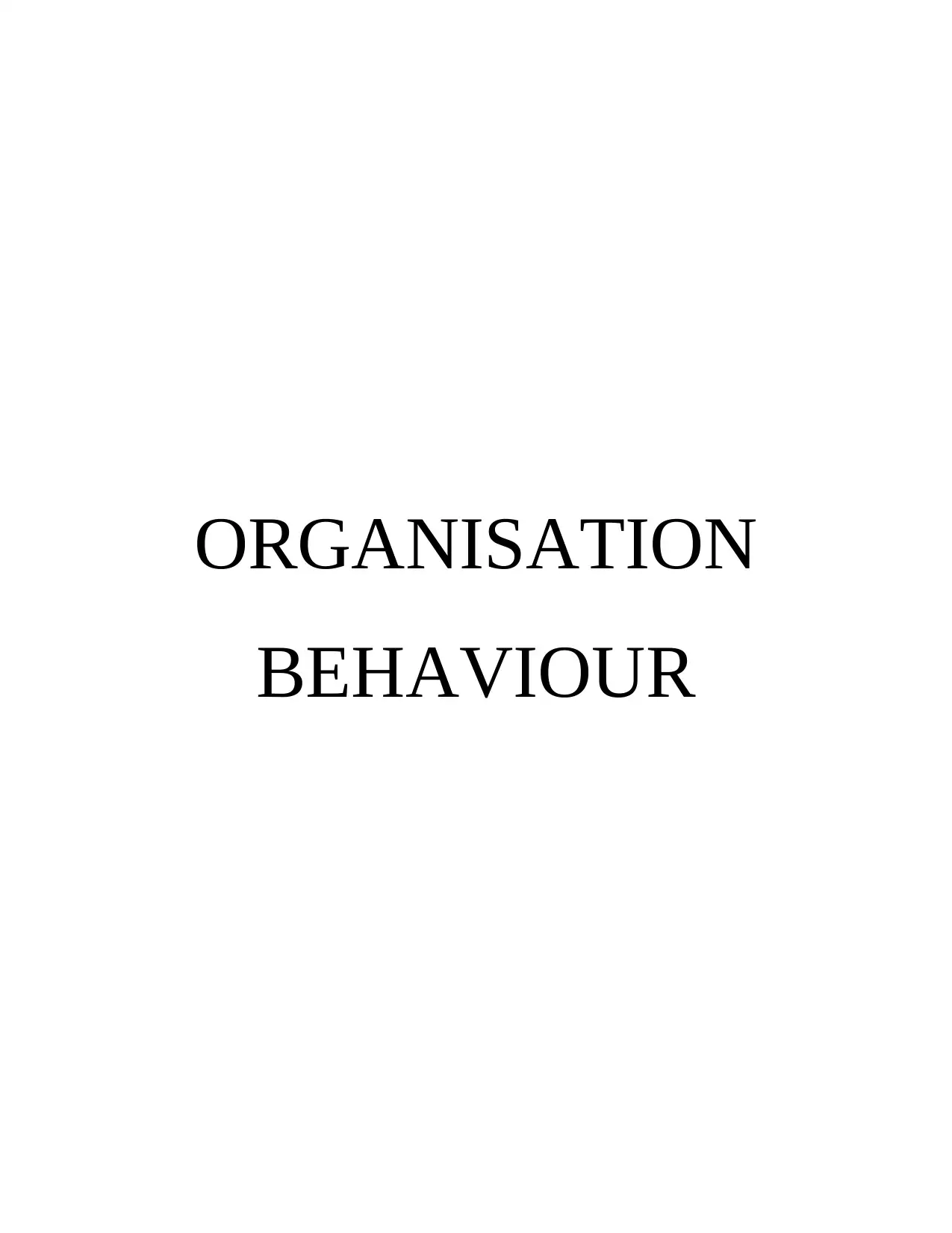
ORGANISATION
BEHAVIOUR
BEHAVIOUR
Paraphrase This Document
Need a fresh take? Get an instant paraphrase of this document with our AI Paraphraser
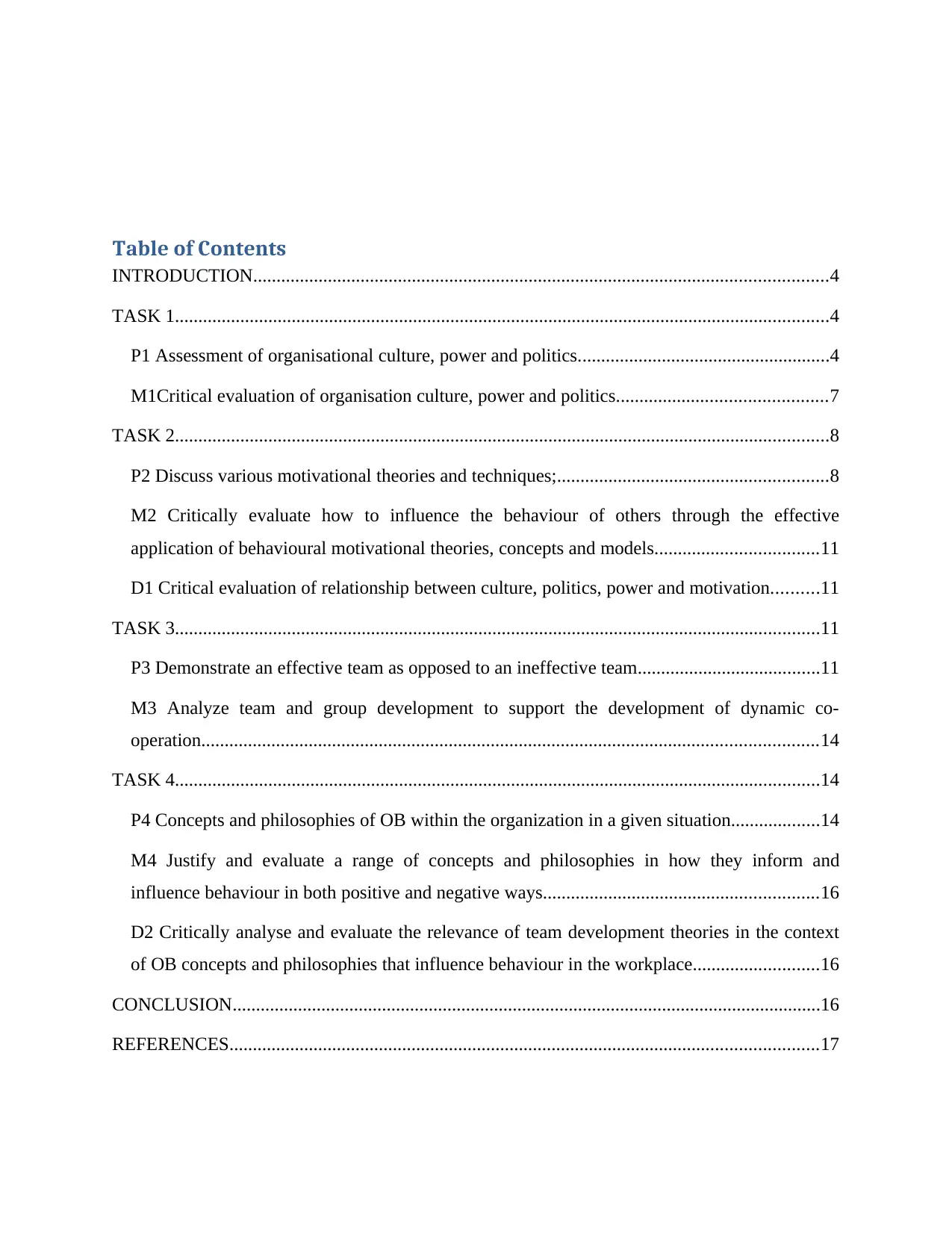
Table of Contents
INTRODUCTION...........................................................................................................................4
TASK 1............................................................................................................................................4
P1 Assessment of organisational culture, power and politics......................................................4
M1Critical evaluation of organisation culture, power and politics.............................................7
TASK 2............................................................................................................................................8
P2 Discuss various motivational theories and techniques;..........................................................8
M2 Critically evaluate how to influence the behaviour of others through the effective
application of behavioural motivational theories, concepts and models...................................11
D1 Critical evaluation of relationship between culture, politics, power and motivation..........11
TASK 3..........................................................................................................................................11
P3 Demonstrate an effective team as opposed to an ineffective team.......................................11
M3 Analyze team and group development to support the development of dynamic co-
operation....................................................................................................................................14
TASK 4..........................................................................................................................................14
P4 Concepts and philosophies of OB within the organization in a given situation...................14
M4 Justify and evaluate a range of concepts and philosophies in how they inform and
influence behaviour in both positive and negative ways...........................................................16
D2 Critically analyse and evaluate the relevance of team development theories in the context
of OB concepts and philosophies that influence behaviour in the workplace...........................16
CONCLUSION..............................................................................................................................16
REFERENCES..............................................................................................................................17
INTRODUCTION...........................................................................................................................4
TASK 1............................................................................................................................................4
P1 Assessment of organisational culture, power and politics......................................................4
M1Critical evaluation of organisation culture, power and politics.............................................7
TASK 2............................................................................................................................................8
P2 Discuss various motivational theories and techniques;..........................................................8
M2 Critically evaluate how to influence the behaviour of others through the effective
application of behavioural motivational theories, concepts and models...................................11
D1 Critical evaluation of relationship between culture, politics, power and motivation..........11
TASK 3..........................................................................................................................................11
P3 Demonstrate an effective team as opposed to an ineffective team.......................................11
M3 Analyze team and group development to support the development of dynamic co-
operation....................................................................................................................................14
TASK 4..........................................................................................................................................14
P4 Concepts and philosophies of OB within the organization in a given situation...................14
M4 Justify and evaluate a range of concepts and philosophies in how they inform and
influence behaviour in both positive and negative ways...........................................................16
D2 Critically analyse and evaluate the relevance of team development theories in the context
of OB concepts and philosophies that influence behaviour in the workplace...........................16
CONCLUSION..............................................................................................................................16
REFERENCES..............................................................................................................................17
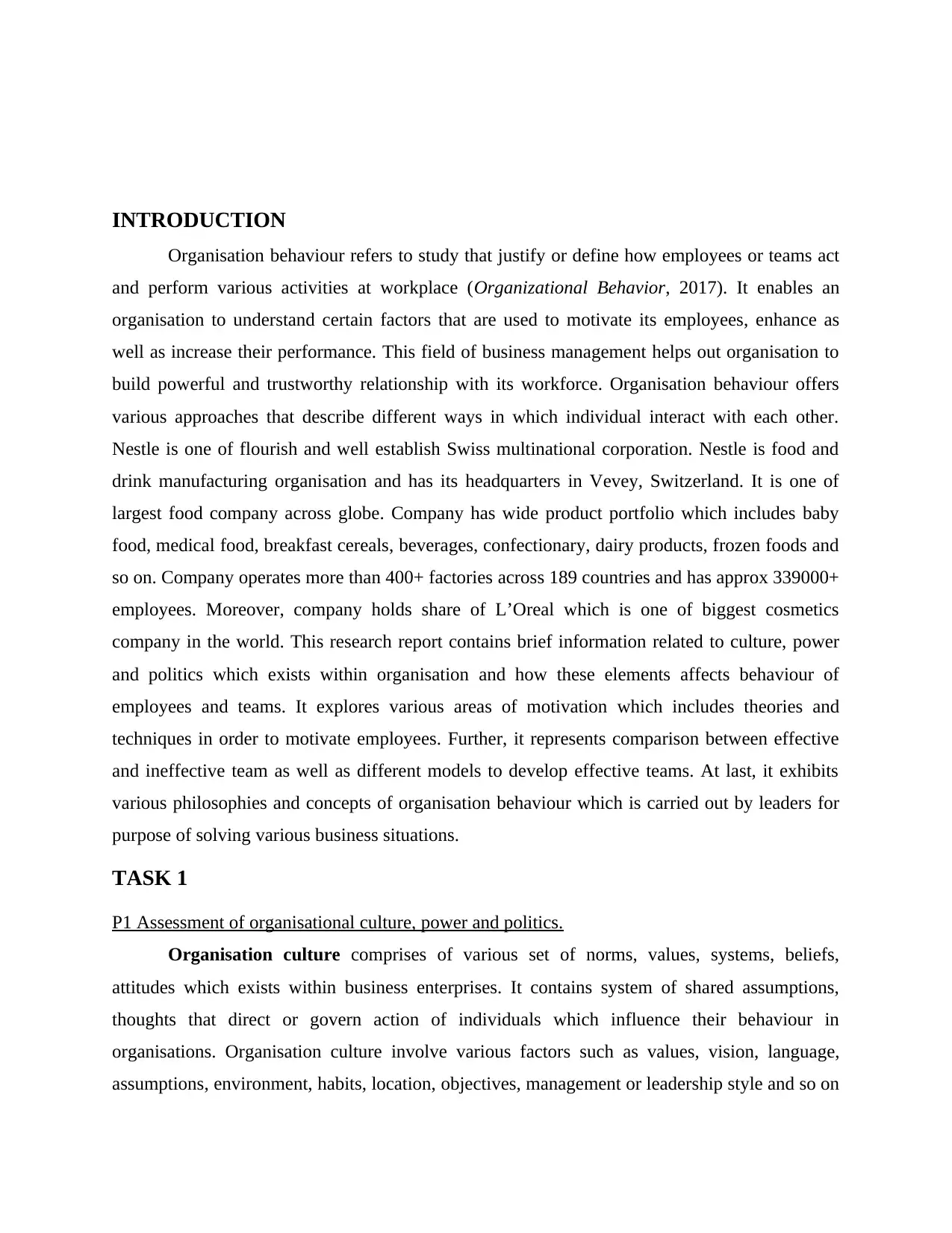
INTRODUCTION
Organisation behaviour refers to study that justify or define how employees or teams act
and perform various activities at workplace (Organizational Behavior, 2017). It enables an
organisation to understand certain factors that are used to motivate its employees, enhance as
well as increase their performance. This field of business management helps out organisation to
build powerful and trustworthy relationship with its workforce. Organisation behaviour offers
various approaches that describe different ways in which individual interact with each other.
Nestle is one of flourish and well establish Swiss multinational corporation. Nestle is food and
drink manufacturing organisation and has its headquarters in Vevey, Switzerland. It is one of
largest food company across globe. Company has wide product portfolio which includes baby
food, medical food, breakfast cereals, beverages, confectionary, dairy products, frozen foods and
so on. Company operates more than 400+ factories across 189 countries and has approx 339000+
employees. Moreover, company holds share of L’Oreal which is one of biggest cosmetics
company in the world. This research report contains brief information related to culture, power
and politics which exists within organisation and how these elements affects behaviour of
employees and teams. It explores various areas of motivation which includes theories and
techniques in order to motivate employees. Further, it represents comparison between effective
and ineffective team as well as different models to develop effective teams. At last, it exhibits
various philosophies and concepts of organisation behaviour which is carried out by leaders for
purpose of solving various business situations.
TASK 1
P1 Assessment of organisational culture, power and politics.
Organisation culture comprises of various set of norms, values, systems, beliefs,
attitudes which exists within business enterprises. It contains system of shared assumptions,
thoughts that direct or govern action of individuals which influence their behaviour in
organisations. Organisation culture involve various factors such as values, vision, language,
assumptions, environment, habits, location, objectives, management or leadership style and so on
Organisation behaviour refers to study that justify or define how employees or teams act
and perform various activities at workplace (Organizational Behavior, 2017). It enables an
organisation to understand certain factors that are used to motivate its employees, enhance as
well as increase their performance. This field of business management helps out organisation to
build powerful and trustworthy relationship with its workforce. Organisation behaviour offers
various approaches that describe different ways in which individual interact with each other.
Nestle is one of flourish and well establish Swiss multinational corporation. Nestle is food and
drink manufacturing organisation and has its headquarters in Vevey, Switzerland. It is one of
largest food company across globe. Company has wide product portfolio which includes baby
food, medical food, breakfast cereals, beverages, confectionary, dairy products, frozen foods and
so on. Company operates more than 400+ factories across 189 countries and has approx 339000+
employees. Moreover, company holds share of L’Oreal which is one of biggest cosmetics
company in the world. This research report contains brief information related to culture, power
and politics which exists within organisation and how these elements affects behaviour of
employees and teams. It explores various areas of motivation which includes theories and
techniques in order to motivate employees. Further, it represents comparison between effective
and ineffective team as well as different models to develop effective teams. At last, it exhibits
various philosophies and concepts of organisation behaviour which is carried out by leaders for
purpose of solving various business situations.
TASK 1
P1 Assessment of organisational culture, power and politics.
Organisation culture comprises of various set of norms, values, systems, beliefs,
attitudes which exists within business enterprises. It contains system of shared assumptions,
thoughts that direct or govern action of individuals which influence their behaviour in
organisations. Organisation culture involve various factors such as values, vision, language,
assumptions, environment, habits, location, objectives, management or leadership style and so on
⊘ This is a preview!⊘
Do you want full access?
Subscribe today to unlock all pages.

Trusted by 1+ million students worldwide
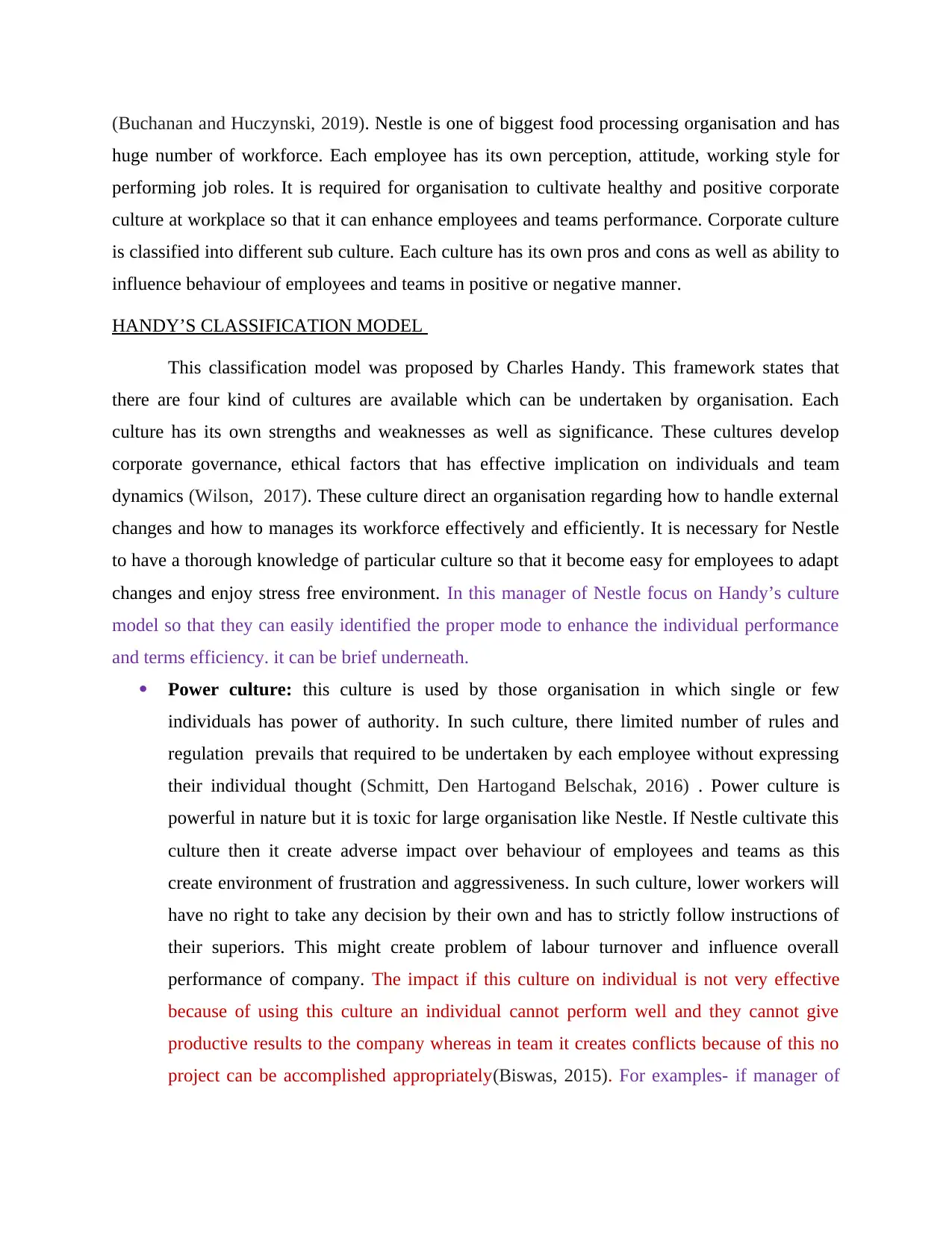
(Buchanan and Huczynski, 2019). Nestle is one of biggest food processing organisation and has
huge number of workforce. Each employee has its own perception, attitude, working style for
performing job roles. It is required for organisation to cultivate healthy and positive corporate
culture at workplace so that it can enhance employees and teams performance. Corporate culture
is classified into different sub culture. Each culture has its own pros and cons as well as ability to
influence behaviour of employees and teams in positive or negative manner.
HANDY’S CLASSIFICATION MODEL
This classification model was proposed by Charles Handy. This framework states that
there are four kind of cultures are available which can be undertaken by organisation. Each
culture has its own strengths and weaknesses as well as significance. These cultures develop
corporate governance, ethical factors that has effective implication on individuals and team
dynamics (Wilson, 2017). These culture direct an organisation regarding how to handle external
changes and how to manages its workforce effectively and efficiently. It is necessary for Nestle
to have a thorough knowledge of particular culture so that it become easy for employees to adapt
changes and enjoy stress free environment. In this manager of Nestle focus on Handy’s culture
model so that they can easily identified the proper mode to enhance the individual performance
and terms efficiency. it can be brief underneath.
Power culture: this culture is used by those organisation in which single or few
individuals has power of authority. In such culture, there limited number of rules and
regulation prevails that required to be undertaken by each employee without expressing
their individual thought (Schmitt, Den Hartogand Belschak, 2016) . Power culture is
powerful in nature but it is toxic for large organisation like Nestle. If Nestle cultivate this
culture then it create adverse impact over behaviour of employees and teams as this
create environment of frustration and aggressiveness. In such culture, lower workers will
have no right to take any decision by their own and has to strictly follow instructions of
their superiors. This might create problem of labour turnover and influence overall
performance of company. The impact if this culture on individual is not very effective
because of using this culture an individual cannot perform well and they cannot give
productive results to the company whereas in team it creates conflicts because of this no
project can be accomplished appropriately(Biswas, 2015). For examples- if manager of
huge number of workforce. Each employee has its own perception, attitude, working style for
performing job roles. It is required for organisation to cultivate healthy and positive corporate
culture at workplace so that it can enhance employees and teams performance. Corporate culture
is classified into different sub culture. Each culture has its own pros and cons as well as ability to
influence behaviour of employees and teams in positive or negative manner.
HANDY’S CLASSIFICATION MODEL
This classification model was proposed by Charles Handy. This framework states that
there are four kind of cultures are available which can be undertaken by organisation. Each
culture has its own strengths and weaknesses as well as significance. These cultures develop
corporate governance, ethical factors that has effective implication on individuals and team
dynamics (Wilson, 2017). These culture direct an organisation regarding how to handle external
changes and how to manages its workforce effectively and efficiently. It is necessary for Nestle
to have a thorough knowledge of particular culture so that it become easy for employees to adapt
changes and enjoy stress free environment. In this manager of Nestle focus on Handy’s culture
model so that they can easily identified the proper mode to enhance the individual performance
and terms efficiency. it can be brief underneath.
Power culture: this culture is used by those organisation in which single or few
individuals has power of authority. In such culture, there limited number of rules and
regulation prevails that required to be undertaken by each employee without expressing
their individual thought (Schmitt, Den Hartogand Belschak, 2016) . Power culture is
powerful in nature but it is toxic for large organisation like Nestle. If Nestle cultivate this
culture then it create adverse impact over behaviour of employees and teams as this
create environment of frustration and aggressiveness. In such culture, lower workers will
have no right to take any decision by their own and has to strictly follow instructions of
their superiors. This might create problem of labour turnover and influence overall
performance of company. The impact if this culture on individual is not very effective
because of using this culture an individual cannot perform well and they cannot give
productive results to the company whereas in team it creates conflicts because of this no
project can be accomplished appropriately(Biswas, 2015). For examples- if manager of
Paraphrase This Document
Need a fresh take? Get an instant paraphrase of this document with our AI Paraphraser
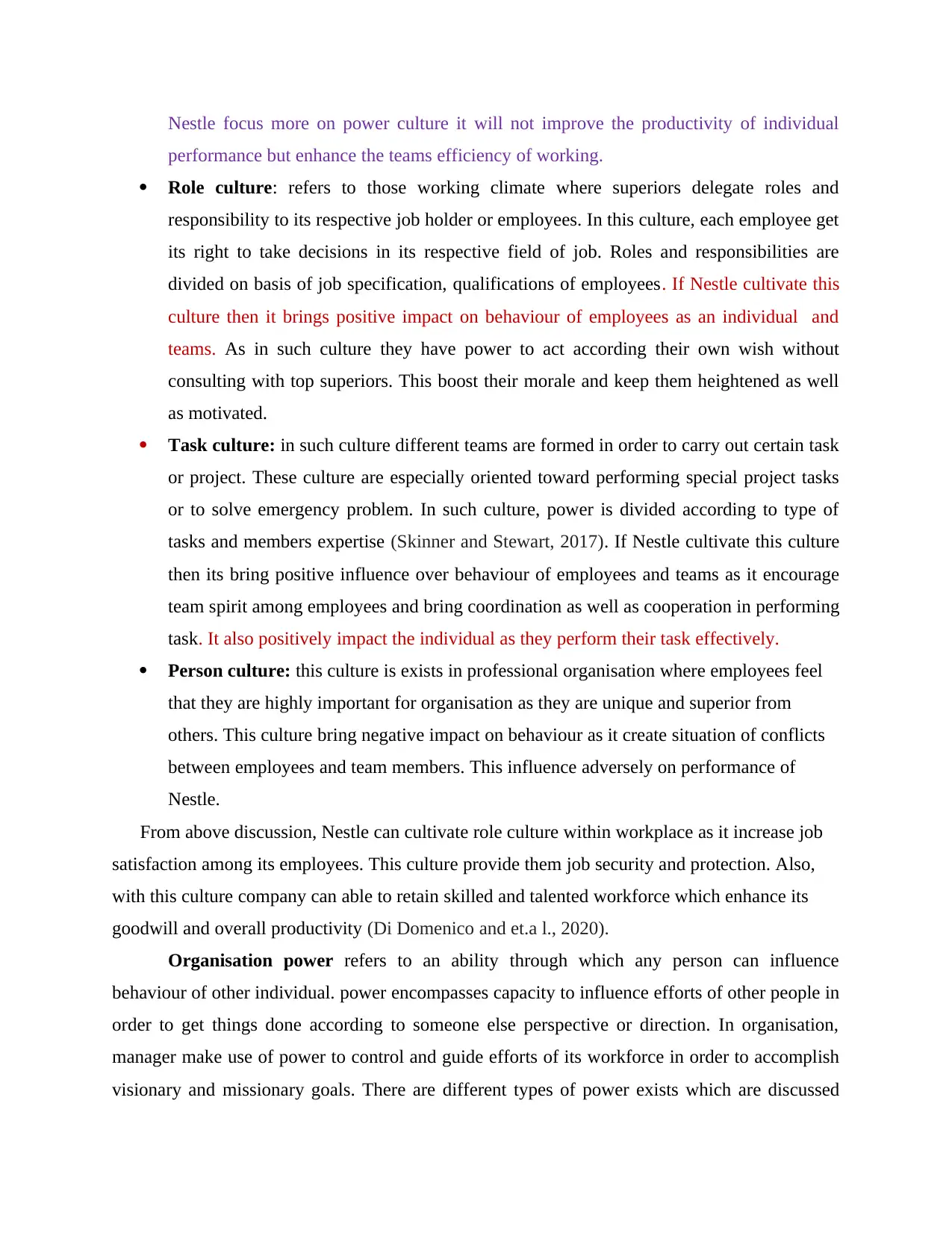
Nestle focus more on power culture it will not improve the productivity of individual
performance but enhance the teams efficiency of working.
Role culture: refers to those working climate where superiors delegate roles and
responsibility to its respective job holder or employees. In this culture, each employee get
its right to take decisions in its respective field of job. Roles and responsibilities are
divided on basis of job specification, qualifications of employees. If Nestle cultivate this
culture then it brings positive impact on behaviour of employees as an individual and
teams. As in such culture they have power to act according their own wish without
consulting with top superiors. This boost their morale and keep them heightened as well
as motivated.
Task culture: in such culture different teams are formed in order to carry out certain task
or project. These culture are especially oriented toward performing special project tasks
or to solve emergency problem. In such culture, power is divided according to type of
tasks and members expertise (Skinner and Stewart, 2017). If Nestle cultivate this culture
then its bring positive influence over behaviour of employees and teams as it encourage
team spirit among employees and bring coordination as well as cooperation in performing
task. It also positively impact the individual as they perform their task effectively.
Person culture: this culture is exists in professional organisation where employees feel
that they are highly important for organisation as they are unique and superior from
others. This culture bring negative impact on behaviour as it create situation of conflicts
between employees and team members. This influence adversely on performance of
Nestle.
From above discussion, Nestle can cultivate role culture within workplace as it increase job
satisfaction among its employees. This culture provide them job security and protection. Also,
with this culture company can able to retain skilled and talented workforce which enhance its
goodwill and overall productivity (Di Domenico and et.a l., 2020).
Organisation power refers to an ability through which any person can influence
behaviour of other individual. power encompasses capacity to influence efforts of other people in
order to get things done according to someone else perspective or direction. In organisation,
manager make use of power to control and guide efforts of its workforce in order to accomplish
visionary and missionary goals. There are different types of power exists which are discussed
performance but enhance the teams efficiency of working.
Role culture: refers to those working climate where superiors delegate roles and
responsibility to its respective job holder or employees. In this culture, each employee get
its right to take decisions in its respective field of job. Roles and responsibilities are
divided on basis of job specification, qualifications of employees. If Nestle cultivate this
culture then it brings positive impact on behaviour of employees as an individual and
teams. As in such culture they have power to act according their own wish without
consulting with top superiors. This boost their morale and keep them heightened as well
as motivated.
Task culture: in such culture different teams are formed in order to carry out certain task
or project. These culture are especially oriented toward performing special project tasks
or to solve emergency problem. In such culture, power is divided according to type of
tasks and members expertise (Skinner and Stewart, 2017). If Nestle cultivate this culture
then its bring positive influence over behaviour of employees and teams as it encourage
team spirit among employees and bring coordination as well as cooperation in performing
task. It also positively impact the individual as they perform their task effectively.
Person culture: this culture is exists in professional organisation where employees feel
that they are highly important for organisation as they are unique and superior from
others. This culture bring negative impact on behaviour as it create situation of conflicts
between employees and team members. This influence adversely on performance of
Nestle.
From above discussion, Nestle can cultivate role culture within workplace as it increase job
satisfaction among its employees. This culture provide them job security and protection. Also,
with this culture company can able to retain skilled and talented workforce which enhance its
goodwill and overall productivity (Di Domenico and et.a l., 2020).
Organisation power refers to an ability through which any person can influence
behaviour of other individual. power encompasses capacity to influence efforts of other people in
order to get things done according to someone else perspective or direction. In organisation,
manager make use of power to control and guide efforts of its workforce in order to accomplish
visionary and missionary goals. There are different types of power exists which are discussed
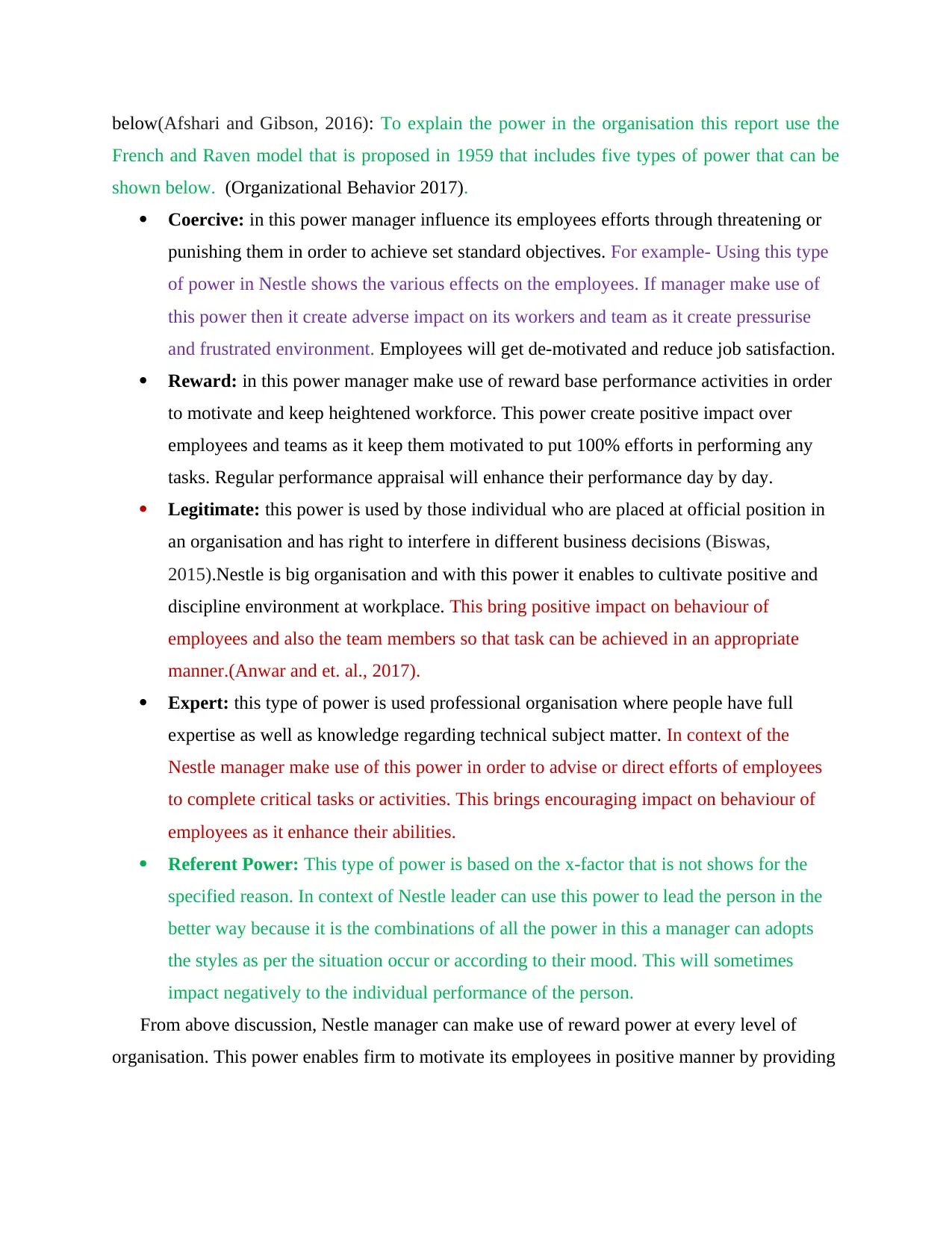
below(Afshari and Gibson, 2016): To explain the power in the organisation this report use the
French and Raven model that is proposed in 1959 that includes five types of power that can be
shown below. (Organizational Behavior 2017).
Coercive: in this power manager influence its employees efforts through threatening or
punishing them in order to achieve set standard objectives. For example- Using this type
of power in Nestle shows the various effects on the employees. If manager make use of
this power then it create adverse impact on its workers and team as it create pressurise
and frustrated environment. Employees will get de-motivated and reduce job satisfaction.
Reward: in this power manager make use of reward base performance activities in order
to motivate and keep heightened workforce. This power create positive impact over
employees and teams as it keep them motivated to put 100% efforts in performing any
tasks. Regular performance appraisal will enhance their performance day by day.
Legitimate: this power is used by those individual who are placed at official position in
an organisation and has right to interfere in different business decisions (Biswas,
2015).Nestle is big organisation and with this power it enables to cultivate positive and
discipline environment at workplace. This bring positive impact on behaviour of
employees and also the team members so that task can be achieved in an appropriate
manner.(Anwar and et. al., 2017).
Expert: this type of power is used professional organisation where people have full
expertise as well as knowledge regarding technical subject matter. In context of the
Nestle manager make use of this power in order to advise or direct efforts of employees
to complete critical tasks or activities. This brings encouraging impact on behaviour of
employees as it enhance their abilities.
Referent Power: This type of power is based on the x-factor that is not shows for the
specified reason. In context of Nestle leader can use this power to lead the person in the
better way because it is the combinations of all the power in this a manager can adopts
the styles as per the situation occur or according to their mood. This will sometimes
impact negatively to the individual performance of the person.
From above discussion, Nestle manager can make use of reward power at every level of
organisation. This power enables firm to motivate its employees in positive manner by providing
French and Raven model that is proposed in 1959 that includes five types of power that can be
shown below. (Organizational Behavior 2017).
Coercive: in this power manager influence its employees efforts through threatening or
punishing them in order to achieve set standard objectives. For example- Using this type
of power in Nestle shows the various effects on the employees. If manager make use of
this power then it create adverse impact on its workers and team as it create pressurise
and frustrated environment. Employees will get de-motivated and reduce job satisfaction.
Reward: in this power manager make use of reward base performance activities in order
to motivate and keep heightened workforce. This power create positive impact over
employees and teams as it keep them motivated to put 100% efforts in performing any
tasks. Regular performance appraisal will enhance their performance day by day.
Legitimate: this power is used by those individual who are placed at official position in
an organisation and has right to interfere in different business decisions (Biswas,
2015).Nestle is big organisation and with this power it enables to cultivate positive and
discipline environment at workplace. This bring positive impact on behaviour of
employees and also the team members so that task can be achieved in an appropriate
manner.(Anwar and et. al., 2017).
Expert: this type of power is used professional organisation where people have full
expertise as well as knowledge regarding technical subject matter. In context of the
Nestle manager make use of this power in order to advise or direct efforts of employees
to complete critical tasks or activities. This brings encouraging impact on behaviour of
employees as it enhance their abilities.
Referent Power: This type of power is based on the x-factor that is not shows for the
specified reason. In context of Nestle leader can use this power to lead the person in the
better way because it is the combinations of all the power in this a manager can adopts
the styles as per the situation occur or according to their mood. This will sometimes
impact negatively to the individual performance of the person.
From above discussion, Nestle manager can make use of reward power at every level of
organisation. This power enables firm to motivate its employees in positive manner by providing
⊘ This is a preview!⊘
Do you want full access?
Subscribe today to unlock all pages.

Trusted by 1+ million students worldwide
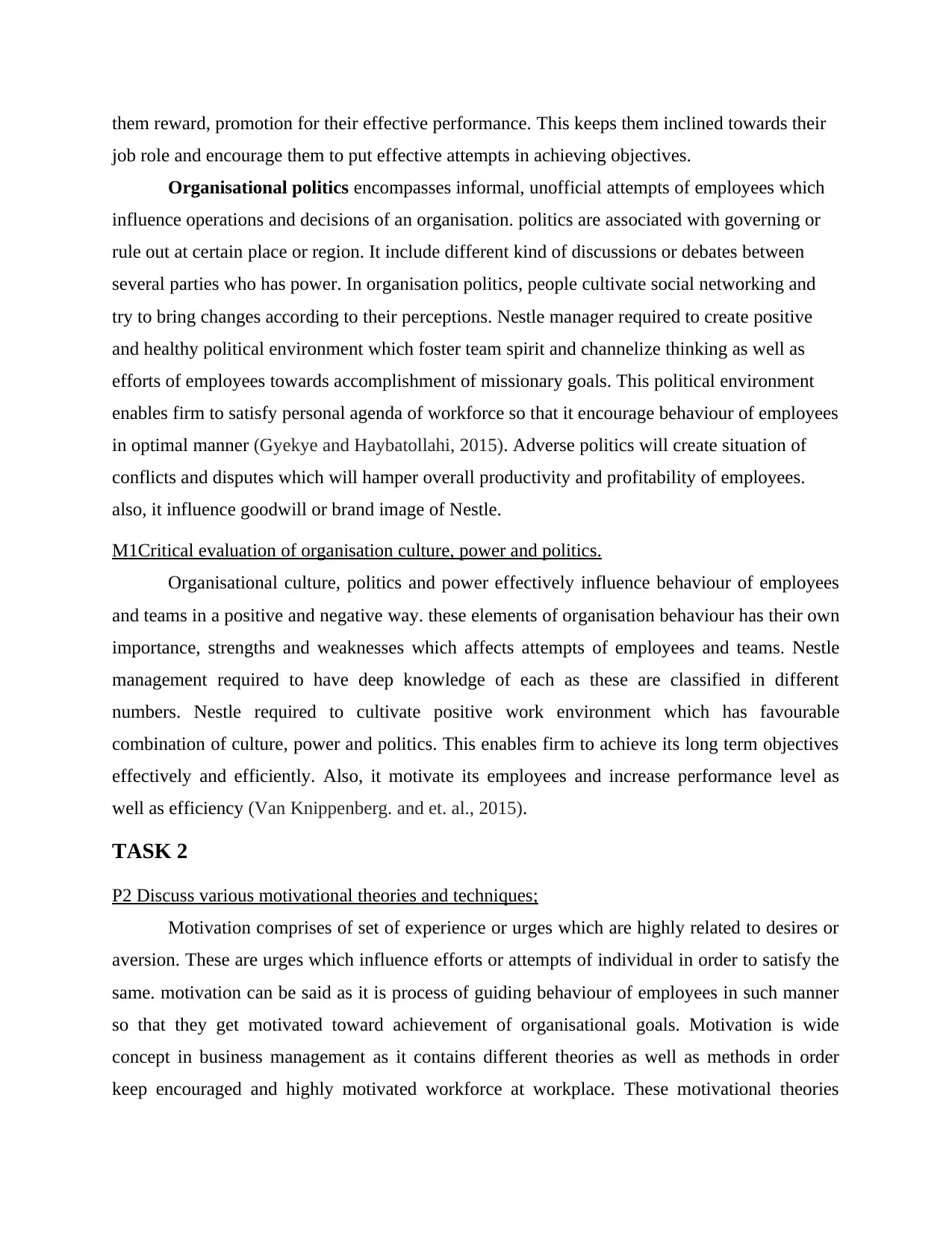
them reward, promotion for their effective performance. This keeps them inclined towards their
job role and encourage them to put effective attempts in achieving objectives.
Organisational politics encompasses informal, unofficial attempts of employees which
influence operations and decisions of an organisation. politics are associated with governing or
rule out at certain place or region. It include different kind of discussions or debates between
several parties who has power. In organisation politics, people cultivate social networking and
try to bring changes according to their perceptions. Nestle manager required to create positive
and healthy political environment which foster team spirit and channelize thinking as well as
efforts of employees towards accomplishment of missionary goals. This political environment
enables firm to satisfy personal agenda of workforce so that it encourage behaviour of employees
in optimal manner (Gyekye and Haybatollahi, 2015). Adverse politics will create situation of
conflicts and disputes which will hamper overall productivity and profitability of employees.
also, it influence goodwill or brand image of Nestle.
M1Critical evaluation of organisation culture, power and politics.
Organisational culture, politics and power effectively influence behaviour of employees
and teams in a positive and negative way. these elements of organisation behaviour has their own
importance, strengths and weaknesses which affects attempts of employees and teams. Nestle
management required to have deep knowledge of each as these are classified in different
numbers. Nestle required to cultivate positive work environment which has favourable
combination of culture, power and politics. This enables firm to achieve its long term objectives
effectively and efficiently. Also, it motivate its employees and increase performance level as
well as efficiency (Van Knippenberg. and et. al., 2015).
TASK 2
P2 Discuss various motivational theories and techniques;
Motivation comprises of set of experience or urges which are highly related to desires or
aversion. These are urges which influence efforts or attempts of individual in order to satisfy the
same. motivation can be said as it is process of guiding behaviour of employees in such manner
so that they get motivated toward achievement of organisational goals. Motivation is wide
concept in business management as it contains different theories as well as methods in order
keep encouraged and highly motivated workforce at workplace. These motivational theories
job role and encourage them to put effective attempts in achieving objectives.
Organisational politics encompasses informal, unofficial attempts of employees which
influence operations and decisions of an organisation. politics are associated with governing or
rule out at certain place or region. It include different kind of discussions or debates between
several parties who has power. In organisation politics, people cultivate social networking and
try to bring changes according to their perceptions. Nestle manager required to create positive
and healthy political environment which foster team spirit and channelize thinking as well as
efforts of employees towards accomplishment of missionary goals. This political environment
enables firm to satisfy personal agenda of workforce so that it encourage behaviour of employees
in optimal manner (Gyekye and Haybatollahi, 2015). Adverse politics will create situation of
conflicts and disputes which will hamper overall productivity and profitability of employees.
also, it influence goodwill or brand image of Nestle.
M1Critical evaluation of organisation culture, power and politics.
Organisational culture, politics and power effectively influence behaviour of employees
and teams in a positive and negative way. these elements of organisation behaviour has their own
importance, strengths and weaknesses which affects attempts of employees and teams. Nestle
management required to have deep knowledge of each as these are classified in different
numbers. Nestle required to cultivate positive work environment which has favourable
combination of culture, power and politics. This enables firm to achieve its long term objectives
effectively and efficiently. Also, it motivate its employees and increase performance level as
well as efficiency (Van Knippenberg. and et. al., 2015).
TASK 2
P2 Discuss various motivational theories and techniques;
Motivation comprises of set of experience or urges which are highly related to desires or
aversion. These are urges which influence efforts or attempts of individual in order to satisfy the
same. motivation can be said as it is process of guiding behaviour of employees in such manner
so that they get motivated toward achievement of organisational goals. Motivation is wide
concept in business management as it contains different theories as well as methods in order
keep encouraged and highly motivated workforce at workplace. These motivational theories
Paraphrase This Document
Need a fresh take? Get an instant paraphrase of this document with our AI Paraphraser
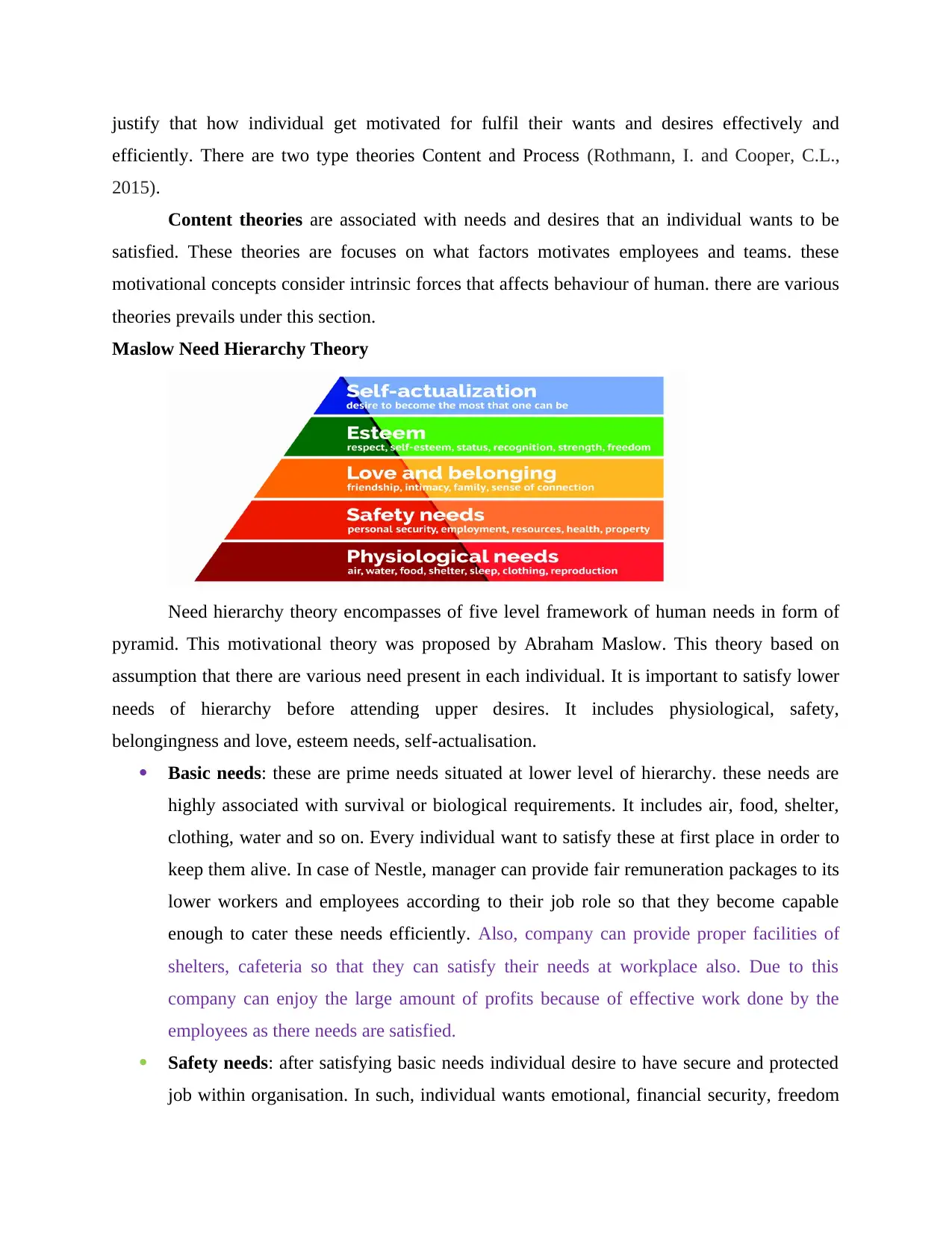
justify that how individual get motivated for fulfil their wants and desires effectively and
efficiently. There are two type theories Content and Process (Rothmann, I. and Cooper, C.L.,
2015).
Content theories are associated with needs and desires that an individual wants to be
satisfied. These theories are focuses on what factors motivates employees and teams. these
motivational concepts consider intrinsic forces that affects behaviour of human. there are various
theories prevails under this section.
Maslow Need Hierarchy Theory
Need hierarchy theory encompasses of five level framework of human needs in form of
pyramid. This motivational theory was proposed by Abraham Maslow. This theory based on
assumption that there are various need present in each individual. It is important to satisfy lower
needs of hierarchy before attending upper desires. It includes physiological, safety,
belongingness and love, esteem needs, self-actualisation.
Basic needs: these are prime needs situated at lower level of hierarchy. these needs are
highly associated with survival or biological requirements. It includes air, food, shelter,
clothing, water and so on. Every individual want to satisfy these at first place in order to
keep them alive. In case of Nestle, manager can provide fair remuneration packages to its
lower workers and employees according to their job role so that they become capable
enough to cater these needs efficiently. Also, company can provide proper facilities of
shelters, cafeteria so that they can satisfy their needs at workplace also. Due to this
company can enjoy the large amount of profits because of effective work done by the
employees as there needs are satisfied.
Safety needs: after satisfying basic needs individual desire to have secure and protected
job within organisation. In such, individual wants emotional, financial security, freedom
efficiently. There are two type theories Content and Process (Rothmann, I. and Cooper, C.L.,
2015).
Content theories are associated with needs and desires that an individual wants to be
satisfied. These theories are focuses on what factors motivates employees and teams. these
motivational concepts consider intrinsic forces that affects behaviour of human. there are various
theories prevails under this section.
Maslow Need Hierarchy Theory
Need hierarchy theory encompasses of five level framework of human needs in form of
pyramid. This motivational theory was proposed by Abraham Maslow. This theory based on
assumption that there are various need present in each individual. It is important to satisfy lower
needs of hierarchy before attending upper desires. It includes physiological, safety,
belongingness and love, esteem needs, self-actualisation.
Basic needs: these are prime needs situated at lower level of hierarchy. these needs are
highly associated with survival or biological requirements. It includes air, food, shelter,
clothing, water and so on. Every individual want to satisfy these at first place in order to
keep them alive. In case of Nestle, manager can provide fair remuneration packages to its
lower workers and employees according to their job role so that they become capable
enough to cater these needs efficiently. Also, company can provide proper facilities of
shelters, cafeteria so that they can satisfy their needs at workplace also. Due to this
company can enjoy the large amount of profits because of effective work done by the
employees as there needs are satisfied.
Safety needs: after satisfying basic needs individual desire to have secure and protected
job within organisation. In such, individual wants emotional, financial security, freedom
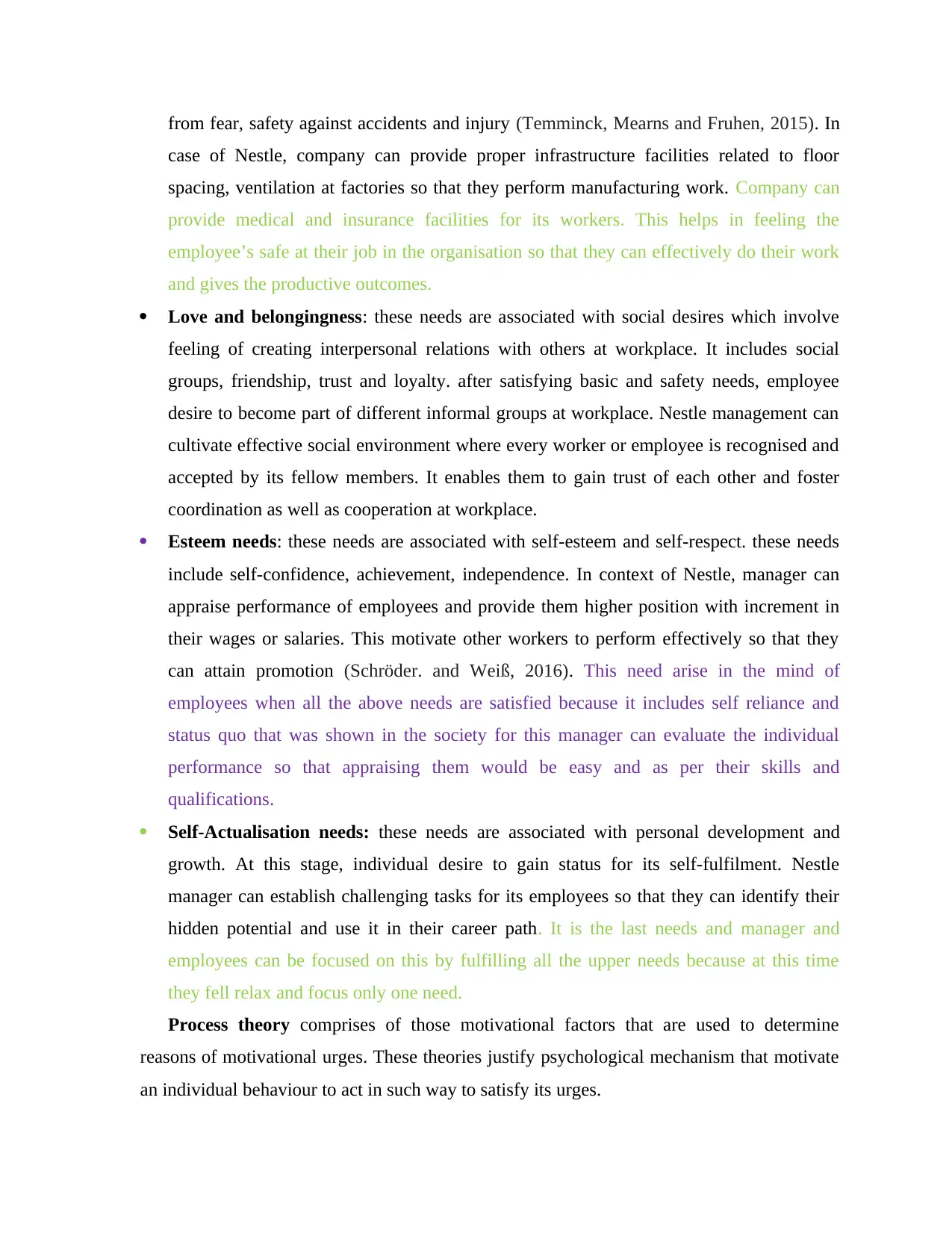
from fear, safety against accidents and injury (Temminck, Mearns and Fruhen, 2015). In
case of Nestle, company can provide proper infrastructure facilities related to floor
spacing, ventilation at factories so that they perform manufacturing work. Company can
provide medical and insurance facilities for its workers. This helps in feeling the
employee’s safe at their job in the organisation so that they can effectively do their work
and gives the productive outcomes.
Love and belongingness: these needs are associated with social desires which involve
feeling of creating interpersonal relations with others at workplace. It includes social
groups, friendship, trust and loyalty. after satisfying basic and safety needs, employee
desire to become part of different informal groups at workplace. Nestle management can
cultivate effective social environment where every worker or employee is recognised and
accepted by its fellow members. It enables them to gain trust of each other and foster
coordination as well as cooperation at workplace.
Esteem needs: these needs are associated with self-esteem and self-respect. these needs
include self-confidence, achievement, independence. In context of Nestle, manager can
appraise performance of employees and provide them higher position with increment in
their wages or salaries. This motivate other workers to perform effectively so that they
can attain promotion (Schröder. and Weiß, 2016). This need arise in the mind of
employees when all the above needs are satisfied because it includes self reliance and
status quo that was shown in the society for this manager can evaluate the individual
performance so that appraising them would be easy and as per their skills and
qualifications.
Self-Actualisation needs: these needs are associated with personal development and
growth. At this stage, individual desire to gain status for its self-fulfilment. Nestle
manager can establish challenging tasks for its employees so that they can identify their
hidden potential and use it in their career path. It is the last needs and manager and
employees can be focused on this by fulfilling all the upper needs because at this time
they fell relax and focus only one need.
Process theory comprises of those motivational factors that are used to determine
reasons of motivational urges. These theories justify psychological mechanism that motivate
an individual behaviour to act in such way to satisfy its urges.
case of Nestle, company can provide proper infrastructure facilities related to floor
spacing, ventilation at factories so that they perform manufacturing work. Company can
provide medical and insurance facilities for its workers. This helps in feeling the
employee’s safe at their job in the organisation so that they can effectively do their work
and gives the productive outcomes.
Love and belongingness: these needs are associated with social desires which involve
feeling of creating interpersonal relations with others at workplace. It includes social
groups, friendship, trust and loyalty. after satisfying basic and safety needs, employee
desire to become part of different informal groups at workplace. Nestle management can
cultivate effective social environment where every worker or employee is recognised and
accepted by its fellow members. It enables them to gain trust of each other and foster
coordination as well as cooperation at workplace.
Esteem needs: these needs are associated with self-esteem and self-respect. these needs
include self-confidence, achievement, independence. In context of Nestle, manager can
appraise performance of employees and provide them higher position with increment in
their wages or salaries. This motivate other workers to perform effectively so that they
can attain promotion (Schröder. and Weiß, 2016). This need arise in the mind of
employees when all the above needs are satisfied because it includes self reliance and
status quo that was shown in the society for this manager can evaluate the individual
performance so that appraising them would be easy and as per their skills and
qualifications.
Self-Actualisation needs: these needs are associated with personal development and
growth. At this stage, individual desire to gain status for its self-fulfilment. Nestle
manager can establish challenging tasks for its employees so that they can identify their
hidden potential and use it in their career path. It is the last needs and manager and
employees can be focused on this by fulfilling all the upper needs because at this time
they fell relax and focus only one need.
Process theory comprises of those motivational factors that are used to determine
reasons of motivational urges. These theories justify psychological mechanism that motivate
an individual behaviour to act in such way to satisfy its urges.
⊘ This is a preview!⊘
Do you want full access?
Subscribe today to unlock all pages.

Trusted by 1+ million students worldwide
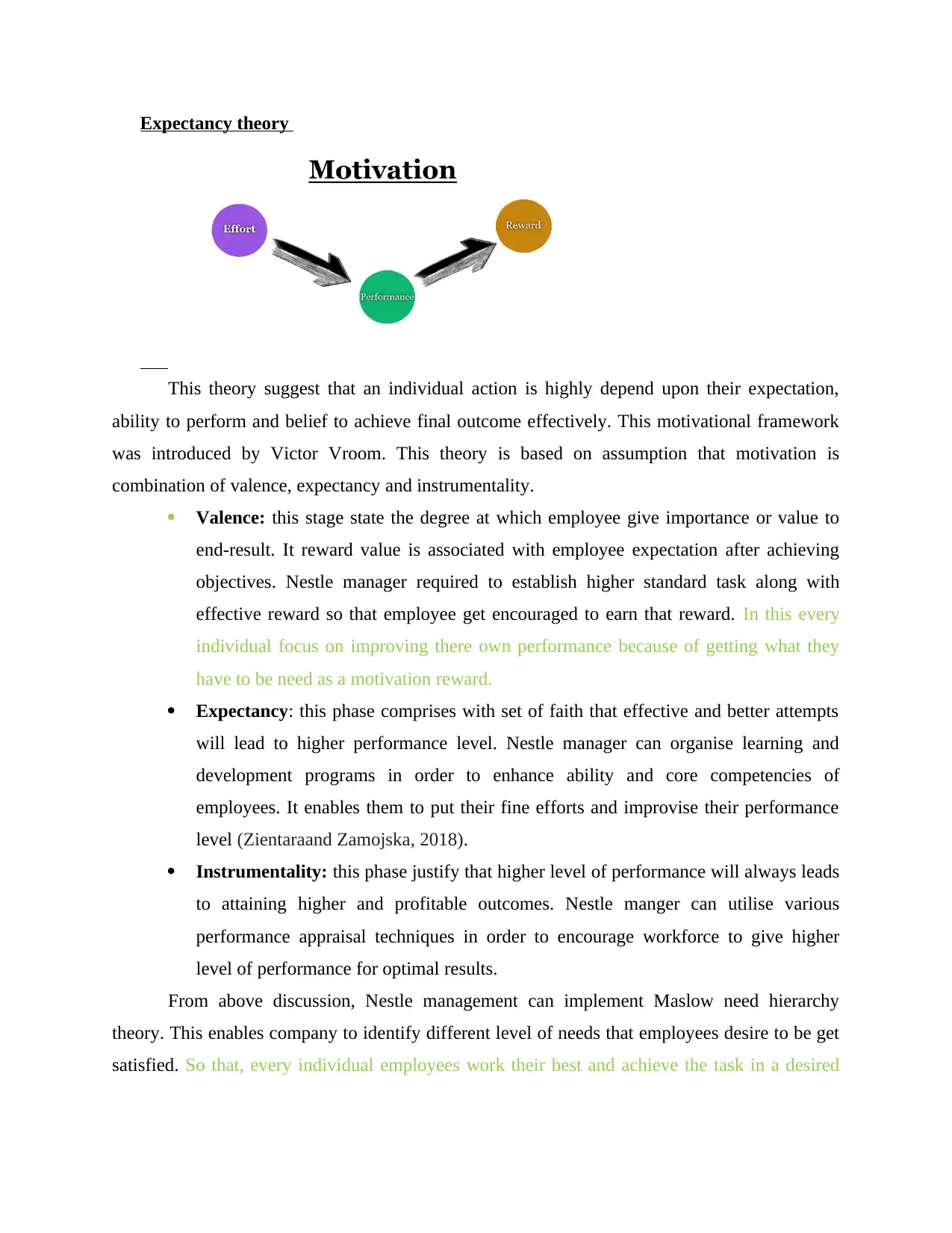
Expectancy theory
This theory suggest that an individual action is highly depend upon their expectation,
ability to perform and belief to achieve final outcome effectively. This motivational framework
was introduced by Victor Vroom. This theory is based on assumption that motivation is
combination of valence, expectancy and instrumentality.
Valence: this stage state the degree at which employee give importance or value to
end-result. It reward value is associated with employee expectation after achieving
objectives. Nestle manager required to establish higher standard task along with
effective reward so that employee get encouraged to earn that reward. In this every
individual focus on improving there own performance because of getting what they
have to be need as a motivation reward.
Expectancy: this phase comprises with set of faith that effective and better attempts
will lead to higher performance level. Nestle manager can organise learning and
development programs in order to enhance ability and core competencies of
employees. It enables them to put their fine efforts and improvise their performance
level (Zientaraand Zamojska, 2018).
Instrumentality: this phase justify that higher level of performance will always leads
to attaining higher and profitable outcomes. Nestle manger can utilise various
performance appraisal techniques in order to encourage workforce to give higher
level of performance for optimal results.
From above discussion, Nestle management can implement Maslow need hierarchy
theory. This enables company to identify different level of needs that employees desire to be get
satisfied. So that, every individual employees work their best and achieve the task in a desired
This theory suggest that an individual action is highly depend upon their expectation,
ability to perform and belief to achieve final outcome effectively. This motivational framework
was introduced by Victor Vroom. This theory is based on assumption that motivation is
combination of valence, expectancy and instrumentality.
Valence: this stage state the degree at which employee give importance or value to
end-result. It reward value is associated with employee expectation after achieving
objectives. Nestle manager required to establish higher standard task along with
effective reward so that employee get encouraged to earn that reward. In this every
individual focus on improving there own performance because of getting what they
have to be need as a motivation reward.
Expectancy: this phase comprises with set of faith that effective and better attempts
will lead to higher performance level. Nestle manager can organise learning and
development programs in order to enhance ability and core competencies of
employees. It enables them to put their fine efforts and improvise their performance
level (Zientaraand Zamojska, 2018).
Instrumentality: this phase justify that higher level of performance will always leads
to attaining higher and profitable outcomes. Nestle manger can utilise various
performance appraisal techniques in order to encourage workforce to give higher
level of performance for optimal results.
From above discussion, Nestle management can implement Maslow need hierarchy
theory. This enables company to identify different level of needs that employees desire to be get
satisfied. So that, every individual employees work their best and achieve the task in a desired
Paraphrase This Document
Need a fresh take? Get an instant paraphrase of this document with our AI Paraphraser
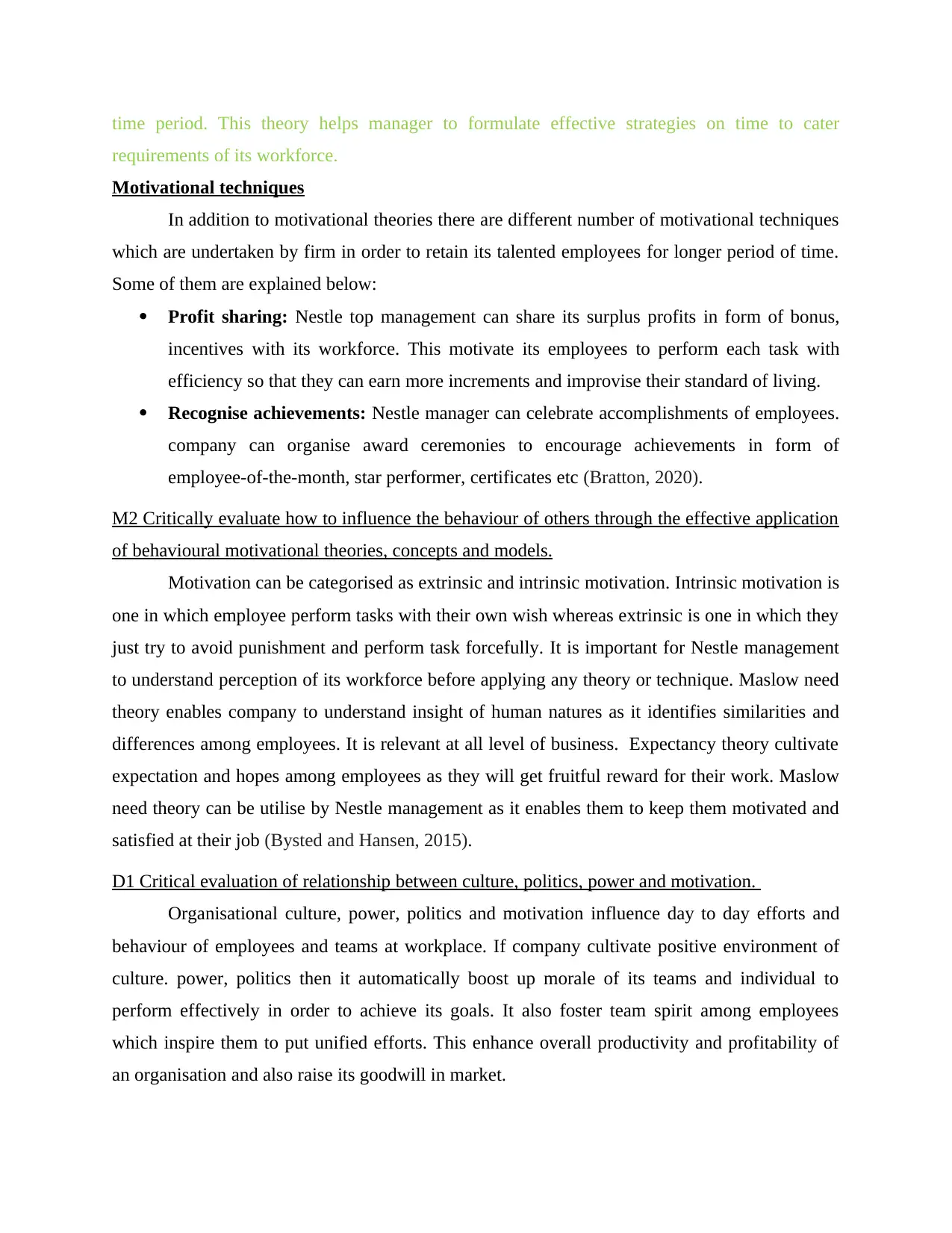
time period. This theory helps manager to formulate effective strategies on time to cater
requirements of its workforce.
Motivational techniques
In addition to motivational theories there are different number of motivational techniques
which are undertaken by firm in order to retain its talented employees for longer period of time.
Some of them are explained below:
Profit sharing: Nestle top management can share its surplus profits in form of bonus,
incentives with its workforce. This motivate its employees to perform each task with
efficiency so that they can earn more increments and improvise their standard of living.
Recognise achievements: Nestle manager can celebrate accomplishments of employees.
company can organise award ceremonies to encourage achievements in form of
employee-of-the-month, star performer, certificates etc (Bratton, 2020).
M2 Critically evaluate how to influence the behaviour of others through the effective application
of behavioural motivational theories, concepts and models.
Motivation can be categorised as extrinsic and intrinsic motivation. Intrinsic motivation is
one in which employee perform tasks with their own wish whereas extrinsic is one in which they
just try to avoid punishment and perform task forcefully. It is important for Nestle management
to understand perception of its workforce before applying any theory or technique. Maslow need
theory enables company to understand insight of human natures as it identifies similarities and
differences among employees. It is relevant at all level of business. Expectancy theory cultivate
expectation and hopes among employees as they will get fruitful reward for their work. Maslow
need theory can be utilise by Nestle management as it enables them to keep them motivated and
satisfied at their job (Bysted and Hansen, 2015).
D1 Critical evaluation of relationship between culture, politics, power and motivation.
Organisational culture, power, politics and motivation influence day to day efforts and
behaviour of employees and teams at workplace. If company cultivate positive environment of
culture. power, politics then it automatically boost up morale of its teams and individual to
perform effectively in order to achieve its goals. It also foster team spirit among employees
which inspire them to put unified efforts. This enhance overall productivity and profitability of
an organisation and also raise its goodwill in market.
requirements of its workforce.
Motivational techniques
In addition to motivational theories there are different number of motivational techniques
which are undertaken by firm in order to retain its talented employees for longer period of time.
Some of them are explained below:
Profit sharing: Nestle top management can share its surplus profits in form of bonus,
incentives with its workforce. This motivate its employees to perform each task with
efficiency so that they can earn more increments and improvise their standard of living.
Recognise achievements: Nestle manager can celebrate accomplishments of employees.
company can organise award ceremonies to encourage achievements in form of
employee-of-the-month, star performer, certificates etc (Bratton, 2020).
M2 Critically evaluate how to influence the behaviour of others through the effective application
of behavioural motivational theories, concepts and models.
Motivation can be categorised as extrinsic and intrinsic motivation. Intrinsic motivation is
one in which employee perform tasks with their own wish whereas extrinsic is one in which they
just try to avoid punishment and perform task forcefully. It is important for Nestle management
to understand perception of its workforce before applying any theory or technique. Maslow need
theory enables company to understand insight of human natures as it identifies similarities and
differences among employees. It is relevant at all level of business. Expectancy theory cultivate
expectation and hopes among employees as they will get fruitful reward for their work. Maslow
need theory can be utilise by Nestle management as it enables them to keep them motivated and
satisfied at their job (Bysted and Hansen, 2015).
D1 Critical evaluation of relationship between culture, politics, power and motivation.
Organisational culture, power, politics and motivation influence day to day efforts and
behaviour of employees and teams at workplace. If company cultivate positive environment of
culture. power, politics then it automatically boost up morale of its teams and individual to
perform effectively in order to achieve its goals. It also foster team spirit among employees
which inspire them to put unified efforts. This enhance overall productivity and profitability of
an organisation and also raise its goodwill in market.
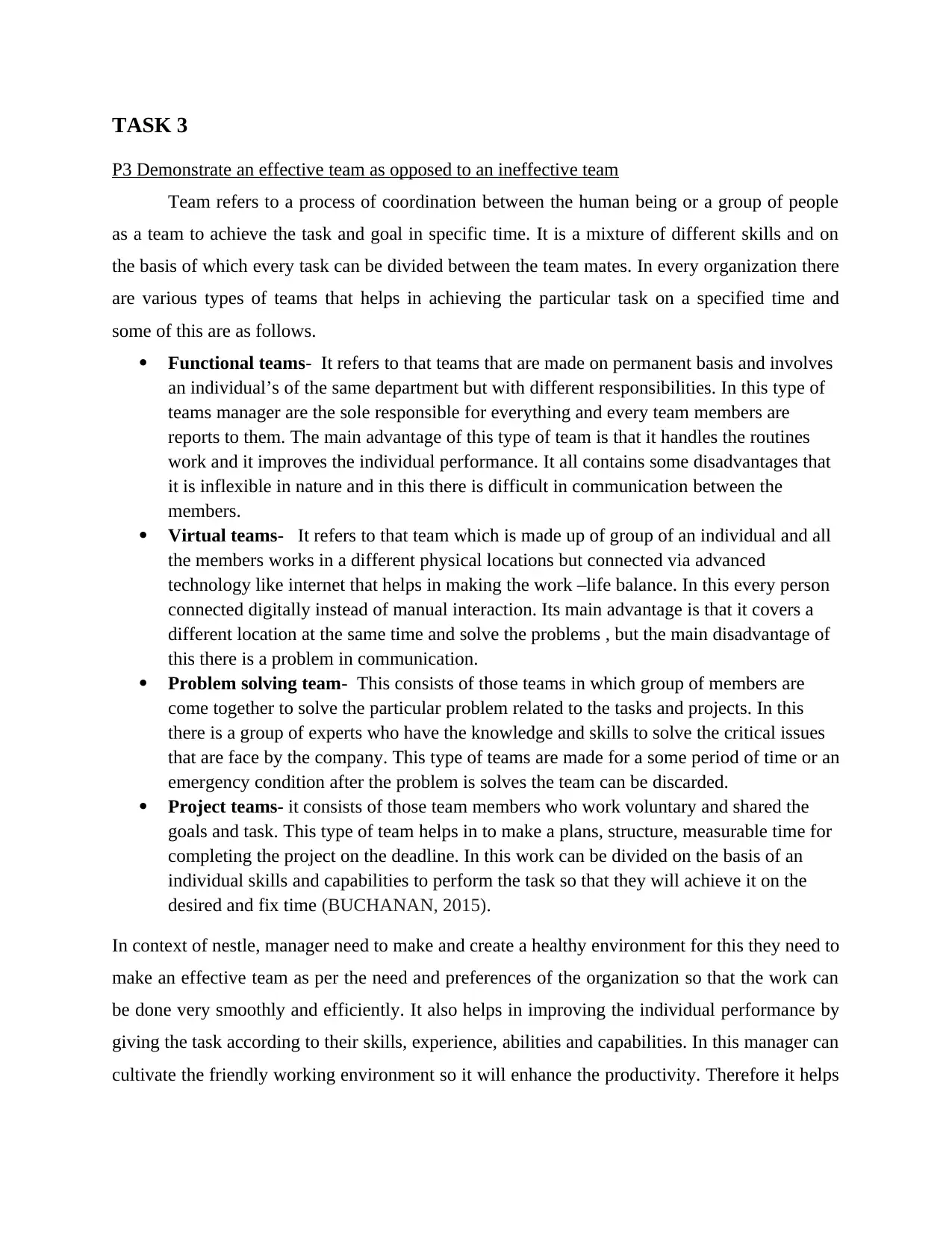
TASK 3
P3 Demonstrate an effective team as opposed to an ineffective team
Team refers to a process of coordination between the human being or a group of people
as a team to achieve the task and goal in specific time. It is a mixture of different skills and on
the basis of which every task can be divided between the team mates. In every organization there
are various types of teams that helps in achieving the particular task on a specified time and
some of this are as follows.
Functional teams- It refers to that teams that are made on permanent basis and involves
an individual’s of the same department but with different responsibilities. In this type of
teams manager are the sole responsible for everything and every team members are
reports to them. The main advantage of this type of team is that it handles the routines
work and it improves the individual performance. It all contains some disadvantages that
it is inflexible in nature and in this there is difficult in communication between the
members.
Virtual teams- It refers to that team which is made up of group of an individual and all
the members works in a different physical locations but connected via advanced
technology like internet that helps in making the work –life balance. In this every person
connected digitally instead of manual interaction. Its main advantage is that it covers a
different location at the same time and solve the problems , but the main disadvantage of
this there is a problem in communication.
Problem solving team- This consists of those teams in which group of members are
come together to solve the particular problem related to the tasks and projects. In this
there is a group of experts who have the knowledge and skills to solve the critical issues
that are face by the company. This type of teams are made for a some period of time or an
emergency condition after the problem is solves the team can be discarded.
Project teams- it consists of those team members who work voluntary and shared the
goals and task. This type of team helps in to make a plans, structure, measurable time for
completing the project on the deadline. In this work can be divided on the basis of an
individual skills and capabilities to perform the task so that they will achieve it on the
desired and fix time (BUCHANAN, 2015).
In context of nestle, manager need to make and create a healthy environment for this they need to
make an effective team as per the need and preferences of the organization so that the work can
be done very smoothly and efficiently. It also helps in improving the individual performance by
giving the task according to their skills, experience, abilities and capabilities. In this manager can
cultivate the friendly working environment so it will enhance the productivity. Therefore it helps
P3 Demonstrate an effective team as opposed to an ineffective team
Team refers to a process of coordination between the human being or a group of people
as a team to achieve the task and goal in specific time. It is a mixture of different skills and on
the basis of which every task can be divided between the team mates. In every organization there
are various types of teams that helps in achieving the particular task on a specified time and
some of this are as follows.
Functional teams- It refers to that teams that are made on permanent basis and involves
an individual’s of the same department but with different responsibilities. In this type of
teams manager are the sole responsible for everything and every team members are
reports to them. The main advantage of this type of team is that it handles the routines
work and it improves the individual performance. It all contains some disadvantages that
it is inflexible in nature and in this there is difficult in communication between the
members.
Virtual teams- It refers to that team which is made up of group of an individual and all
the members works in a different physical locations but connected via advanced
technology like internet that helps in making the work –life balance. In this every person
connected digitally instead of manual interaction. Its main advantage is that it covers a
different location at the same time and solve the problems , but the main disadvantage of
this there is a problem in communication.
Problem solving team- This consists of those teams in which group of members are
come together to solve the particular problem related to the tasks and projects. In this
there is a group of experts who have the knowledge and skills to solve the critical issues
that are face by the company. This type of teams are made for a some period of time or an
emergency condition after the problem is solves the team can be discarded.
Project teams- it consists of those team members who work voluntary and shared the
goals and task. This type of team helps in to make a plans, structure, measurable time for
completing the project on the deadline. In this work can be divided on the basis of an
individual skills and capabilities to perform the task so that they will achieve it on the
desired and fix time (BUCHANAN, 2015).
In context of nestle, manager need to make and create a healthy environment for this they need to
make an effective team as per the need and preferences of the organization so that the work can
be done very smoothly and efficiently. It also helps in improving the individual performance by
giving the task according to their skills, experience, abilities and capabilities. In this manager can
cultivate the friendly working environment so it will enhance the productivity. Therefore it helps
⊘ This is a preview!⊘
Do you want full access?
Subscribe today to unlock all pages.

Trusted by 1+ million students worldwide
1 out of 21
Related Documents
Your All-in-One AI-Powered Toolkit for Academic Success.
+13062052269
info@desklib.com
Available 24*7 on WhatsApp / Email
![[object Object]](/_next/static/media/star-bottom.7253800d.svg)
Unlock your academic potential
Copyright © 2020–2026 A2Z Services. All Rights Reserved. Developed and managed by ZUCOL.



